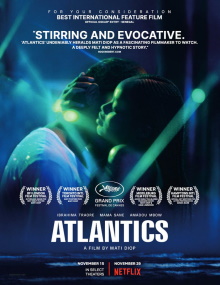
I love watching films from countries whose cinema I’ve had no prior exposure to as everything seems so fresh and novel and there’s a wonderful feeling that anything is possible. This is truer than usual for this Senegalese film, the directorial debut of its woman director Mati Diop. Diop was born in France but it seems that her family is a fairly prominent one in Senegal and this certainly feels both authentic and powerful to me.
Ada who lives in Dakar is a young woman who is betrothed to a wealthy man Omar. However she is actually in love with Souleiman who works as a lowly construction worker. He and his friends have been working on a huge, futuristic looking tower for months but their boss cheats them out of their wages. They decide to set off on a boat to Spain in search of a better life and Souleiman leaves without telling Ada anything. Though depressed Ada proceeds with her marriage to Omar under pressure from her family. The ceremony is lavish and her friends are all impressed by the luxuriously appointed house Omar has provided for her. But then the marriage bed suddenly catches fire and Ada’s sister claims to have seen Souleiman at the party. A young police detective is brought in to investigate the suspected arson case but he fails to find any mundane explanation for what has happened. Indeed, the happenings are overtly supernatural as it seems that Souleiman and his friends have all died at sea and have returned as spirits to seek justice.
I spoiled that little twist there but basically every synopsis and introduction to this film mention what it’s really about so it’s no big deal. As I tend not to read anything about what I watch beforehand, I was surprised by the turn to the supernatural and wondered for a while if it was meant to be taken seriously. Upon reflection, I think it works out very well and even complements the eerie sight of the implausibly huge tower that dominates the skyline and even lends the film a bit of a science-fiction feeling. Combined with the inherent exoticism of the locale and the frequent shots of the sea with all that it represents for them, this is a wonderfully atmospheric and beautiful film. Packed in here is also the bustle of the city of Dakar, a Islamic wedding that involves both solemnity and celebration, Senegalese youths partying it up, there is so much here to marvel just on a pure audio-visual level.
But what I am truly in awe of is the director’s ability to pack in so many rich themes so succinctly and so powerfully. At the heart of this film is the refugee crisis, the boats full of young black people, mostly men, who take on tremendous risks to try to make a better life for themselves and their families. But in making this film, I think the director is conscious of the phenomenon of sympathy fatigue. We’ve all been exposed to so many photographs and videos of packed refugee boats by now and sadly such shots are tainted by negative associations. We sympathize but agonize over how much help to give such economic migrants; we wring our hands over problems like cultural compatibility, political blowback and whether encouraging more such refugees causes more long-term problems. So this film neatly sidesteps all this by not showing a single shot of a boat. Instead this film confronts us with the inescapable fact that they are above all, real individuals with real lives of their own. They have dreams, jobs, ties with loved ones and would not have embarked on these dangerous journeys without good reason. By framing the familiar issue in this manner, Diop succeeds in giving it fresh power and impetus, surely one of the highest achievements any artist can aspire to.
At the same time, because it takes a lot to go wrong to drive people to such desperation, this film is about more than just the boat migrants. It’s also about corrupt authorities that allow the rich and powerful to get away with not paying wages, it’s about women being empowered to choose what they want for themselves in life against the wishes of their families, it’s about the extreme disparity in wealth as we see Omar casually toss around money while outside the luxury resorts the streets are dusty and lined with trash. Most of all, I appreciate how this film shows that Dakar is a complex place, full of of people from all walks of life and who want different things. It’s a sad fact that most of the time when we see places like this on a screen it’s usually only to depict them as a hellhole or as the backdrop for gun battles. It’s especially great that this film ends on a somewhat positive note, showing that while Dakar has plenty of problems, Ada is still able to find her own place in it and maybe make a decent life for herself.
From a technical perspective, this film is only passable and we can tell that most of the performers are not professionals. Yet it’s the mark of a great director that she is able to get the most out of the places and the people she has to work with. The authenticity of the experience is unquestionable even including its fantastic elements and the use of the Atlantic Ocean itself to embody the film’s themes and how the city is dependant on it is inspired. All things considered, this is probably one of the most impressive films I’ve watched this year.